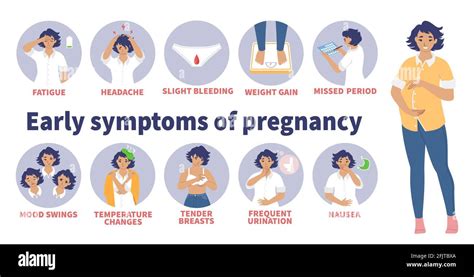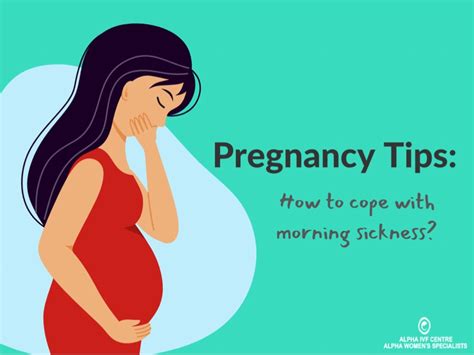Intro
Discover common Pregnancy Sickness Symptoms, including morning sickness, nausea, and fatigue, and learn how to manage them with natural remedies and self-care techniques during early pregnancy and beyond.
Pregnancy is a life-changing experience that brings immense joy to expecting mothers. However, it can also come with its fair share of challenges, one of which is pregnancy sickness. Pregnancy sickness, also known as morning sickness, is a common condition that affects many women during their pregnancy. It is characterized by feelings of nausea and vomiting, which can be triggered by various factors such as hormonal changes, stress, and certain foods. Despite its name, morning sickness can occur at any time of the day, and its severity can vary from woman to woman.
The symptoms of pregnancy sickness can be overwhelming, especially for first-time mothers who may not know what to expect. Some women may experience mild symptoms, while others may have to deal with severe nausea and vomiting that can last throughout the day. In addition to nausea and vomiting, pregnancy sickness can also cause other symptoms such as fatigue, dizziness, and mood swings. These symptoms can make it challenging for women to go about their daily activities, including work, taking care of their families, and maintaining a social life.
Understanding the symptoms of pregnancy sickness is crucial for expecting mothers to manage their condition effectively. By recognizing the signs and symptoms of pregnancy sickness, women can take steps to alleviate their discomfort and prevent complications. Furthermore, knowing what to expect during pregnancy can help women feel more in control and prepared for the challenges that lie ahead. In this article, we will delve into the world of pregnancy sickness, exploring its symptoms, causes, and management strategies. Whether you are an expecting mother or a healthcare provider, this article aims to provide you with valuable insights and information to help you navigate the complexities of pregnancy sickness.
Pregnancy Sickness Symptoms

Pregnancy sickness symptoms can vary from woman to woman, but common symptoms include nausea, vomiting, fatigue, and dizziness. Nausea is often the first symptom to appear, and it can be triggered by various factors such as food, smells, and hormonal changes. Vomiting is another common symptom, and it can be severe enough to cause dehydration and electrolyte imbalances. Fatigue is also a common symptom, as the body works hard to support the growing fetus. Dizziness and lightheadedness can occur due to changes in blood pressure and blood sugar levels.
Other symptoms of pregnancy sickness include:
- Mood swings: Hormonal changes can cause mood swings, irritability, and anxiety.
- Food aversions: Certain foods or smells can trigger nausea and vomiting.
- Increased saliva production: Some women may experience excessive saliva production, which can be uncomfortable and embarrassing.
- Headaches: Hormonal changes can cause headaches and migraines.
- Breast tenderness: Hormonal changes can cause breast tenderness and swelling.
Causes of Pregnancy Sickness
The exact cause of pregnancy sickness is still unknown, but several factors are thought to contribute to its development. Hormonal changes, particularly the increase in human chorionic gonadotropin (hCG), are believed to play a significant role. hCG is a hormone produced by the placenta, and its levels surge during the first trimester of pregnancy. Other factors that may contribute to pregnancy sickness include: * Genetic predisposition: Women with a family history of pregnancy sickness are more likely to experience it. * Stress: High levels of stress can exacerbate pregnancy sickness symptoms. * Certain foods: Foods high in fat, spice, or sugar can trigger nausea and vomiting. * Sensory sensitivities: Some women may be more sensitive to smells, sights, or sounds, which can trigger nausea and vomiting.Managing Pregnancy Sickness

Managing pregnancy sickness requires a combination of lifestyle changes, dietary modifications, and medical interventions. Here are some tips to help alleviate pregnancy sickness symptoms:
- Eat small, frequent meals: Eating small meals throughout the day can help manage nausea and vomiting.
- Avoid trigger foods: Identify and avoid foods that trigger nausea and vomiting.
- Stay hydrated: Drink plenty of water and other fluids to prevent dehydration.
- Get plenty of rest: Fatigue can exacerbate pregnancy sickness symptoms, so it's essential to get plenty of rest.
- Practice relaxation techniques: Stress can worsen pregnancy sickness symptoms, so practicing relaxation techniques such as deep breathing, meditation, or yoga can help.
Dietary Modifications
Dietary modifications can play a significant role in managing pregnancy sickness. Here are some tips: * Eat bland foods: Bland foods such as crackers, toast, and plain rice can help settle the stomach. * Avoid spicy or fatty foods: Foods high in fat or spice can trigger nausea and vomiting. * Incorporate ginger: Ginger has natural anti-inflammatory properties and can help alleviate nausea and vomiting. * Take vitamin B6 supplements: Vitamin B6 supplements have been shown to reduce pregnancy sickness symptoms.Medical Interventions

In some cases, medical interventions may be necessary to manage pregnancy sickness. Here are some options:
- Anti-nausea medications: Anti-nausea medications such as ondansetron or metoclopramide can help alleviate nausea and vomiting.
- Vitamin B6 injections: Vitamin B6 injections can help reduce pregnancy sickness symptoms.
- Hospitalization: In severe cases of pregnancy sickness, hospitalization may be necessary to manage dehydration and electrolyte imbalances.
Alternative Therapies
Alternative therapies such as acupuncture, acupressure, and herbal remedies may also be helpful in managing pregnancy sickness. Here are some options: * Acupuncture: Acupuncture involves the insertion of fine needles into specific points on the body to stimulate healing and balance. * Acupressure: Acupressure involves the application of pressure to specific points on the body to stimulate healing and balance. * Herbal remedies: Herbal remedies such as ginger, peppermint, and chamomile may help alleviate nausea and vomiting.Preventing Pregnancy Sickness

While it's not possible to completely prevent pregnancy sickness, there are some steps that can be taken to reduce the risk:
- Maintaining a healthy diet: Eating a balanced diet rich in fruits, vegetables, and whole grains can help reduce the risk of pregnancy sickness.
- Staying hydrated: Drinking plenty of water and other fluids can help prevent dehydration and electrolyte imbalances.
- Managing stress: Practicing relaxation techniques such as deep breathing, meditation, or yoga can help reduce stress and alleviate pregnancy sickness symptoms.
- Getting plenty of rest: Fatigue can exacerbate pregnancy sickness symptoms, so it's essential to get plenty of rest.
Conclusion and Final Thoughts
Pregnancy sickness is a common condition that affects many women during their pregnancy. While its symptoms can be overwhelming, there are many ways to manage and alleviate them. By understanding the causes of pregnancy sickness, making lifestyle changes, and seeking medical interventions when necessary, women can reduce their risk of complications and improve their overall health and well-being. If you're experiencing pregnancy sickness, don't hesitate to reach out to your healthcare provider for guidance and support.What are the most common symptoms of pregnancy sickness?
+The most common symptoms of pregnancy sickness include nausea, vomiting, fatigue, and dizziness.
How long does pregnancy sickness typically last?
+Pregnancy sickness typically lasts throughout the first trimester of pregnancy, but it can persist into the second trimester in some cases.
What are some ways to manage pregnancy sickness symptoms?
+Some ways to manage pregnancy sickness symptoms include eating small, frequent meals, avoiding trigger foods, staying hydrated, and practicing relaxation techniques such as deep breathing or meditation.
We hope this article has provided you with valuable insights and information to help you navigate the complexities of pregnancy sickness. If you have any questions or comments, please don't hesitate to reach out. Share this article with your friends and family to help spread awareness about pregnancy sickness and its management. Together, we can support expecting mothers and help them have a healthy and happy pregnancy.
